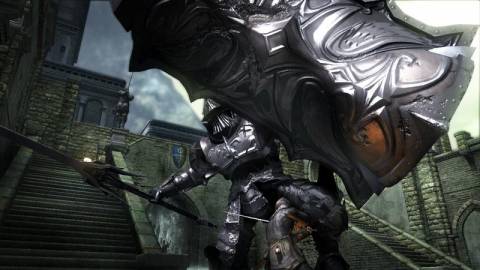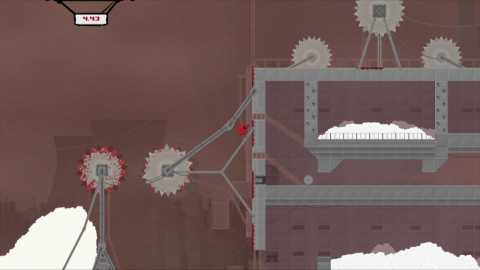Technical vs Emotional Difficulty in the Souls Games
By majormitch 7 Comments
After being killed by the Taurus Demon about a dozen times, you’ve finally conquered him. Your hard work, patience and perseverance have paid off. Take a deep breath and relax for a moment. Not for too long though; that was, after all, only the first boss. There is much more work to do. Alright, ready to move on? Good. Just be careful, you’ve acquired a lot of souls. Wouldn’t want to lose them after all that work you just did. You’re coming up on a bridge. You can see enemy soldiers at the other end. Something about this doesn’t feel right. You’re scared. You step out onto the bridge anyway. Wait a second, what’s that sound? A dragon!? Run as fast as you can! You’re not going to make it! You didn’t make it did you? Alright then, time to regroup. Time to trudge all the way back to that bridge and see if you can’t regain your lost souls...

When Demon’s Souls came out in 2009, the first thing you likely heard about it was how hard it was. The word on this game was that it took no prisoners, and would make you cry big man tears of pain and agony as you suffered one horrible death after another. This sentiment was further echoed as Dark Souls’ release drew near. People seemed to be battening down the hatches for what they dubbed the spiritual successor to the hardest game this entire generation. It seemed to be the popular opinion that the Souls games were for hardcore masochists only, and that your average gamer should steer clear of a series that’s only going to beat you to a pulp.
It’s unfortunate that such a unique and interesting series has become known as simply being “those hard games”. Are the Souls games hard? Yes. Are they the hardest games this generation? No. Is there more to them than their difficulty? Absolutely. These are not weird novelty acts designed solely for people who like hard games, though their difficulty is certainly essential to the experience. There’s a lot of great ideas packed into these deep RPGs, and said ideas are just as likely to manifest themselves while you are exploring, managing items or grinding (you know, normal RPG stuff) as they are while you are facing off against one of the games’ tough enemies. As such, I find it strange that the Souls games have become defined primarily by their difficulty. It got me thinking about what I perceive makes a game hard, and how the Souls games fit into that definition.

When I think of the hardest games I’ve played, I think of things like Super Ghouls 'N Ghosts, Ninja Gaiden (I’m thinking of the 2004 Xbox game, but I’m sure the NES game illustrates my point just as well) or Super Meat Boy. These games are hard because they require you to develop a certain level of skill to get past very specific scenarios. If you come to a segment in Super Meat Boy that contains narrow corridors and moving buzz-saws, for example, you have to perfectly perform a very specific pattern of well timed jumps to get through alive. One false move and you’re done, which is precisely what makes it so hard. Similarly with Ninja Gaiden, you are required to become skilled at the game’s technically demanding and intricate combat. You need to learn your weapon combos and enemy patterns; there’s simply no way around it. These types of games demand that you develop a certain amount of a well defined skill, and that you become proficient at continuously executing that skill to a high degree.
Nothing in the Souls games is anywhere near that demanding on a technical or mechanical level. Timing windows are never that strict, moves are never that complicated to pull off, and being complex RPGs that are not altogether linear, there’s always another option to try when you get stuck. There are any number of ways to approach a given scenario, which means you are never forced to become highly skilled at any particular feat. Sure, it helps in general to be good at things like dodging or properly timing attacks and spells, but those are not necessarily required skills for survival, nor are they substantially difficult tasks to perform on their own merits. What can make them hard, however, is having to perform them under duress.
I like to think of it as something I’ll call emotional difficulty. The way the Souls games let you know up front all the ways you can suffer without ever telling you what to expect makes everything feel much more daunting than it really is. You know that checkpoints are sparse. You know that if you die you will lose all of your souls. You know that there are any number of things that can kill you instantly if you aren’t paying extremely close attention to your surroundings. Yet perhaps most importantly, you never know exactly what lies ahead; we often fear what we don’t know the most. Combine all of these aspects together and you have the perfect recipe for creating a genuinely terrifying experience. You’re always venturing into unknown territory, with any number of potential hazards waiting for you, and you know you’ll be punished fast and hard for making mistakes. It doesn’t help that the game’s suffocating atmosphere reeks of death, despair, doom and gloom.

That’s a powerful notion and a great way to make players scared and uncomfortable, which can drastically affect performance; both physically and mentally. The Souls games do a wonderful job at pulling you out of your comfort zone, which makes you less responsive, less focused, less patient, and ultimately more inclined to make careless mistakes. I’ve had countless deaths caused by being too tense and nervous: rushing ahead without paying attention to traps and hazards, leaving myself open to attack while impatiently attacking an enemy, or accidentally rolling off a cliff in the heat of the moment are not uncommon when you’re on edge. In that sense, conquering a Souls game is as much about conquering your own emotions as much as anything else. For if you can remain calm, take it slow, and asses each situation with a clear head you’re 90% of the way there already.
That’s what makes the Souls games simultaneously so damning and so rewarding. They directly challenge your psyche and your guts more than your reflexes and your ability to execute combos. That’s a battle with infinitely higher stakes; you’re putting the very essence of your being on the line, which produces substantially more extreme highs and lows than any technically hard game can ever muster. It takes an emotionally hard game to evoke such strong feelings from the player, which is perhaps why the Souls games are so commonly remembered for, and defined by, their difficulty. They may or may not be harder than other hard games, but they can certainly feel that way.
You’ve finally made it back to the bridge and regained your lost souls. You see the dragon sitting atop his perch at the opposite end. You know he’s just waiting for you to step onto the bridge; his bridge. A glimmer of hope: you can see an alcove halfway down the bridge on the right. If you can just make it there then maybe, just maybe you’ll be safe. You steel yourself. Ready? Run! Keep running, now to the right, down the stairs! You made it, you’re safe! Great job! All you did was hold down a button and run, but man. That was hard.
